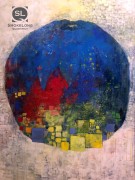Your story pulled a lot from many different tragic references and images. Do you consider a world-view an important function to your writing overall?
Absolutely! The relationship between worldview and my writing is so indelible that I can’t really identify where one ends and the other begins. As a reader, especially as a young reader, my world was almost completely defined by and constructed with the words I read and the stories which whisked me away or taught me about life. Truly, I can think of no greater function for writing than to express or include reality -every dark, dirty, and colorful aspect of reality- within the barriers of form and device.
You mention the stories which taught you about life. Name a few that still have an impact on you today as a writer, a mother, and a woman in the world.
My mind reels when I am asked this question. The impact of great writing and astounding authors has been a continually moving target of mine. I started to read before I could communicate verbally, so books like Richard Scarry’s “Best Storybook Ever!” taught me to have a conversation with reading when I couldn’t have a conversation with people.
I continued to read beneath my age because my parents were told I should. When I was in first grade, my sister and I shared a bedroom, and she read Wilson Rawls’s “Where the Red Fern Grows” out loud. It was all the motivation I needed to seek out more and more words. By third grade I was reading all of my parent’s books, including everything by Stephen King, V.C. Andrews, and J.R.R. Tolkien. King stands out amongst them with a worldview, an idea of humanity’s responses to and responsibilities in the horror of real life, which I felt mirrored my own belief system.
As I grew as a writer and reader, I searched for more diversity in my reading: Layli Long Soldier, Grace Lin, Jhumpa Lahiri, Louise Erdrich, Gavriel Savit, Jandy Nelson, and Roxane Gay just to name a few stacked up on my desk right now. Still, there will always be stories which never fade far from my view, like Dalton Trumbo “Johnny Got his Gun,” Cormac McCarthy’s “The Road,” and Stephen King’s “The Long Walk.” In short fiction, I never lose sight of gut-punching stories evoking that classic flavor, like Dino Buzzati Traverso’s “Falling Girl” and Gabriel Garcia Marquez’s “One of these days.”
Despite all of the darkness in my list, I find there is an incredible light in having that real conversation between words and reader. I suppose I am always circling back to the hours, days, and years I spent reading Richard Scarry before I knew I had anything to say.
I feel the same when it comes to the honesty between words and the reader. It’s funny how as writers, we can find ourselves constantly circling back, as you said, to the writers and books and words we connected with before we knew how to articulate this type of bond. I think that’s why your imagery came through so strongly in this piece, and perhaps why the scenes you portrayed through your imagery felt so real, so palpable. I need to satisfy one more curiosity itch. What do you want to say to readers out there who are writing and submitting and perhaps feeling a little down about their writing and rejections? What piece of advice, if any, do you want to share?
Strange, the association game my mind plays when asked what advice I would offer to writers who, like me, can feel down about rejections and their own writing. The key, I believe, is to return to writing. In other words, return to the reason and the feelings and the personal story which you serve through your love of and dedication to words. It brings me immediately to Sylvia Plath. I was obsessed with her poetry as a teenager (I was probably about the same age as the character in my story). In “The Unabridged Journals of Slyvia Plath,” she wrote, “I wish I could have the ability to write down the feelings I have now when I am little, because when I grow up, I will know how to write, but I will have forgotten what being little feels like.” All of my work -fiction, poetry, and even essay- is leaning toward this effort to express now what I felt at a different time. I suffer from the same insecurities and doubts as all writers do, but the words are really just a page in another private notebook. In fact, Sylvia Plath’s tragic end is another odd coincidence that has me wondering if, in some small way, my character desired the things which would destroy her in the end.
I think that’s beautiful and sound advice, Shoshana. And after reading almost 100 stories out of the queue and having to choose just one, it was both a humbling yet extremely tough job. But your story echoed these questions, curiosities, images that wouldn’t leave my mind. There’s something to be said about a gorgeous piece of writing that not only displays layers of beauty, tragedy, angst, terror, and heartbreak, but also leaves a reader questioning. Thank you for your words and your work, Shoshana.


